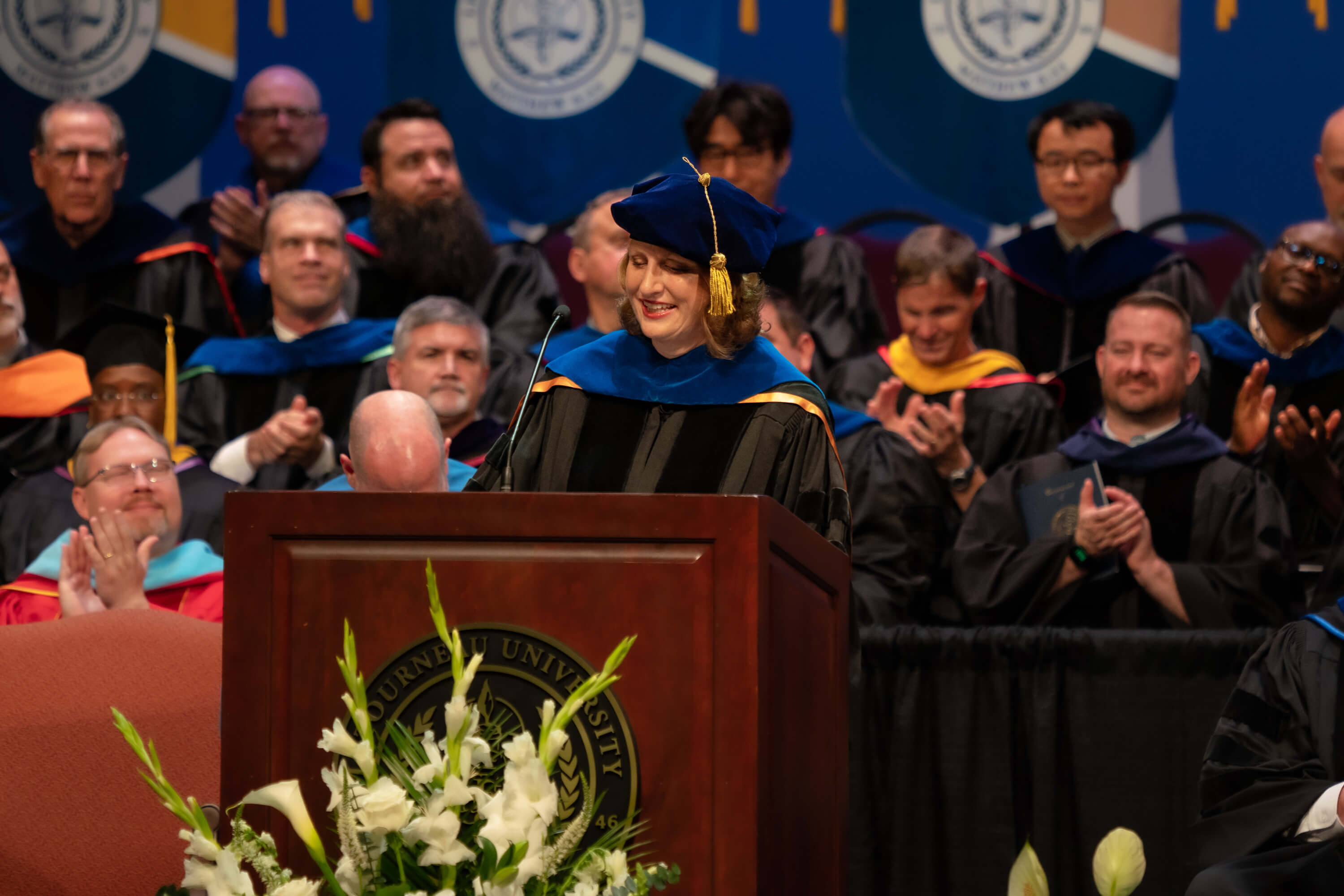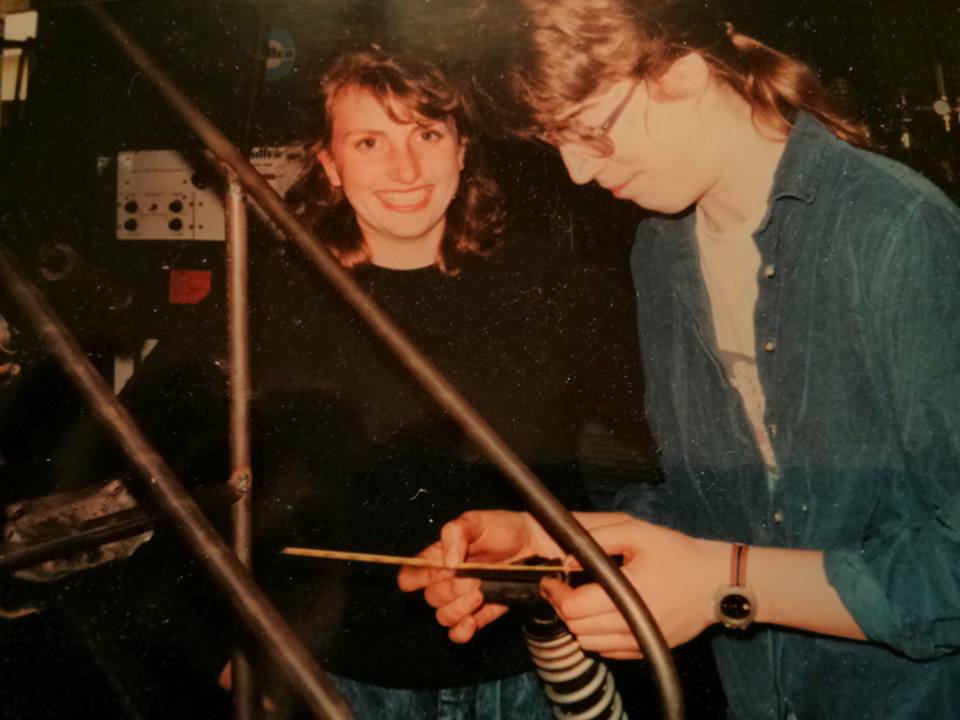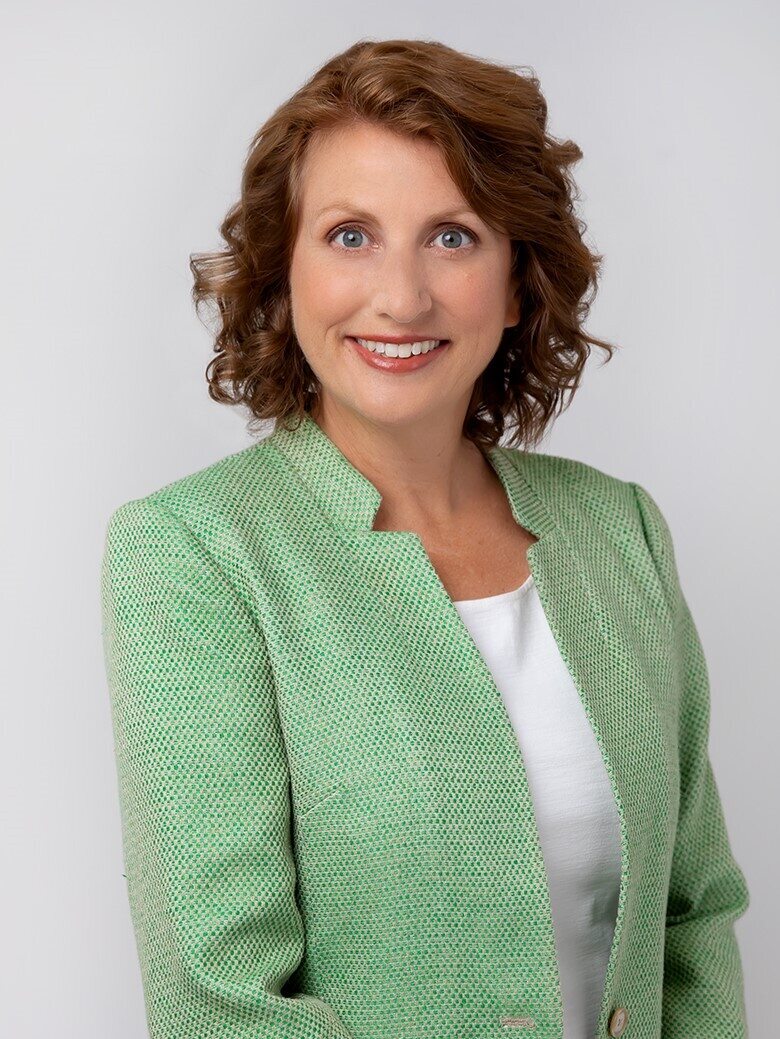Jenelle A. Piepmeier, Ph.D. ('93)
Dr. Jenelle Piepmeier returns to LeTourneau University on the 30th anniversary of her own commencement in 1993, to share the May 2023 commencement address:
 Thank you, graduates, for the privilege of celebrating with you today. I appreciate the invitation. It’s exciting to be back here 30 years after my own commencement on May 8, 1993.
Thank you, graduates, for the privilege of celebrating with you today. I appreciate the invitation. It’s exciting to be back here 30 years after my own commencement on May 8, 1993.
I first stepped foot on campus as a third grader when my dad, Dr. Steve Armstrong, came to teach in a new emerging discipline, computer science. This campus has so many landmarks that are intertwined with my life. Harry Hardwick of Hardwick Hall married my parents. Anna Lee Allen (of the Allen Student Center) was my seventh grade social studies teacher. I was taught by both Betty and Richard Berry (for whom the Berry Auditorium was named).
Some of you may be wondering about my title, the Chair of the Department of Weapons, Robotics, and Control Engineering. I imagine Mrs. Albert, my third grade teacher, who is here today, did not expect little 8-year-old Jenelle to end up one day leading the Weapons department at the Naval Academy with a brass cannon in her office.
30 years ago, as I was graduating, I had just finished taking my first course on robotics from Dr. B. Kyun Lee.
Today, I lead a team of 28 Naval officers and civilian faculty. We teach courses on robotics and feedback control systems to about 225 students majoring in Robotics & Control Engineering every year. We have labs with manipulator arms and classes on autonomous systems that work on the ground, in the water, and in the air. We also teach a course on Weapons Systems (radar, sonar, explosions) to about 1,100 students every year.
I am sure that my Swiss Mennonite great-grandparents would have been very surprised at where I have landed. You, too, are embarking on a life that may take you places you and your family cannot yet imagine.
When President Mason asked me to serve as commencement speaker, I knew that as a federal employee I had to get the speaking engagement and LeTourneau’s gift of travel approved by an ethics counselor at the staff judge advocate general. This was easily obtained. But one of the requirements in accepting this speaking engagement is to let you know that although I am a Department of the Navy employee, the opinions and assertions expressed in today’s speech are my own and do not necessarily reflect the official policy or position of the United States Government, the Department of Defense, or the Department of the Navy.
When you think of a spokesperson for the DoD or the Navy -what image did you have in mind? I am pretty sure you were not picturing me.
And Federal Government, I have to say, I can relate. Sometimes I want to send my kids out the door with a label that says “this child does not reflect my views.” For instance, I think pajama pants should not be worn
outside.
This is such a contrast with what we see in Genesis 1, where we’re told “God created human beings; he created them reflecting God’s nature.”
I may reflect the image of a Naval Academy professor. Or of a LeTourneau graduate. But the most important image I bear is the image of God. In fact, we all reflect his nature. We all bear his image. All of humanity. Not just those in the right group. Or the graduates of the right schools (although this one is pretty great!), or those that attend the right churches.
Take a look around. All of us—the faculty, the graduates, the proud families—you are all image-bearers of God. Everyone here in Longview, Texas. Everyone you meet and interact with in the year ahead in your new communities—all image-bearers.
And as you reflect back on the past few years here at LeTourneau, and you think about the skills and gifts you have discovered and practiced and cultivated, those are a reflection of God’s nature.
I have always loved math and science. And I knew when I read the LeTourneau course catalog back in 1989 that I wanted to study engineering. Now there weren’t a lot of people that looked like me in my classes, but I knew, even then, that I was created to be an engineer and, as it turns out, I was made to study and eventually teach robotics! Do you know the first time I ever stepped foot in an engineering class taught by a woman? It was ES450 Introduction to Robotics at 8:55 one August morning in 1999, in Annapolis. I was stepping into my own classroom for the first time.
As you are moving into the roles that the LeTourneau faculty have worked so hard to prepare you for, your careers will all be different and may go in unexpected directions. We see that in the narratives in the Bible. There are so many ways in which the image bearers served their communities. They were tent-makers and wall builders. They worked in textiles and traded in real estate. They were judges and military leaders and executives. And those were just the women.
One of the challenging things about moving out into the world beyond the university is the lack of a syllabus. You know, the document the faculty gave you on the first day of class that said, "Here’s the plan. These are the assignments and these are the topics we’re covering. Here are the major due dates."
But there’s no syllabus in life. There aren’t even lab handouts. Quite often, you’re given a task or role, and it doesn’t come with step by step instructions. They don’t hand those out when you engage in new relationships at work. Or at the hospital when your kids are born. There’s no TA giving you a hint that “this colleague will need extra grace today” or “this kid will mostly eat chicken nuggets.”
So how does anyone know what to do? How do we as Christians know what is the right way for us to work and engage in our communities and in our families?
 There is a concept in the military known as the OODA Loop. OODA is an acronym for Observe, Orient, Decide, and Act. It is the idea of observing what’s going on around you, orienting yourself in the context of what is happening now and what you want to happen in the future, deciding what to do in light of your observations, training, and goals, and then acting. It’s called a loop because you need to keep doing it over and over. Military units with faster loops can more quickly achieve their objective.
There is a concept in the military known as the OODA Loop. OODA is an acronym for Observe, Orient, Decide, and Act. It is the idea of observing what’s going on around you, orienting yourself in the context of what is happening now and what you want to happen in the future, deciding what to do in light of your observations, training, and goals, and then acting. It’s called a loop because you need to keep doing it over and over. Military units with faster loops can more quickly achieve their objective.
This is very similar to the feedback control loop that is used in autonomous systems. Autonomous systems have a desired behavior. For your HVAC system, that might be a desired temperature setting. For your vehicle operating in adaptive cruise control, that might be to maintain a desired speed while not hitting the car in front of you. For a drone, it might be to maintain a desired altitude. To do these things autonomously, the system needs a sensor—to observe. The controller—usually a small computer board—compares the desired behavior with the actual situation observed by the sensors and makes some decisions and sends commands to the actuator.
But the tricky part—the one that I alluded to earlier—is that sometimes, as we navigate through life, we’re a little uncertain about what the “desired behavior” for our system should be. What do I orient myself to? Where should I live? What job should I take? Who should I marry? How should I act at work? How do I respond to my colleagues? What should I post on social media? How should I reply in the group chat? What is the best way to parent this child? And what is the best way to parent her brother?
And the answer is found in Micah 6:8:
“He has shown you, O mortal, what is good. And what does the LORD require of you? To act justly and to love mercy and to walk humbly with your God.”
How great is that? This simple admonition gives us our orientation; our desired behavior. Here’s what I’m looking for, He says. Do Justice. Love Mercy. Walk Humbly.
Jesus gives us an echo of this in Mark 12, where he says to first love the Lord our God with all our heart and, secondly, to love our neighbor as ourselves.
So, I would encourage you to have a regular OODA Loop rhythm in your life:
Observe: How are the image bearers around me doing?
Orient: Am I walking humbly, loving mercy, and acting justly as I interact with these image-bearers? Am I loving my neighbor as myself?
Decide: Am I being a worthy image bearer in my daily life? And how do I need to adjust my behavior so I can love my neighbor well?
Act: It’s like Micah 6:8 is the path that Google Maps is routing you on. And now it’s time for you to hit "Start" and embark on your journey. LeTourneau prepared me, not just for the job I have, but to be God's image bearer in my community. You should go forward with the knowledge that you, too, have been prepared and that the grace of God will go with you as you embark on your journey.
About Jenelle A. Piepmeier, Ph.D.
 Dr. Jenelle Piepmeier earned a Bachelor of Science in Mechanical Engineering from LeTourneau University. She went on to earn a Master of Science and Ph.D. from Georgia Institute of Technology, also in Mechanical Engineering. For over 20 years she has taught robotics, computer vision, and control systems to the future leaders of the Navy and Marine Corps at the United States Naval Academy in Annapolis, Maryland. Her former students have gone on to serve in the Navy Seals, command Navy submarines, and develop novel robotic systems.
Dr. Jenelle Piepmeier earned a Bachelor of Science in Mechanical Engineering from LeTourneau University. She went on to earn a Master of Science and Ph.D. from Georgia Institute of Technology, also in Mechanical Engineering. For over 20 years she has taught robotics, computer vision, and control systems to the future leaders of the Navy and Marine Corps at the United States Naval Academy in Annapolis, Maryland. Her former students have gone on to serve in the Navy Seals, command Navy submarines, and develop novel robotic systems.
In the fall of 2020, she became the 66th department chair for what is now known as the Weapons, Robotics, and Control Engineering Department, overseeing an academic program designed to educate midshipmen about robotic manipulation, sensing, and control of autonomous systems on the ground, in the air, and on or below the water’s surface. The department’s history traces back to the Department of Ordinance and Gunnery when the United States Naval Academy was established in 1845; Dr. Piepmeier is the first woman to chair the department. Her research interests included vision-based robotic control at both the micro and macro scales, and she has published numerous articles on the subject.
She met her favorite electrical engineer, Dr. Jeffrey Piepmeier, while at LeTourneau University. He is a Chief Passive Microwave Instruments Engineer at NASA Goddard Space Flight Center. They have been married for 30 years and have three children, ages 19, 18, and 7.
The daughter of emeritus professor Dr. Stephen Armstrong and his wife, Pamela Armstrong, Jenelle is also a graduate of Pine Tree High School, where she was recognized by the Pine Tree ISD Education Foundation as a 2020 Distinguished Alumni. She is a member of LeTourneau’s inaugural 2018 class of the Academy of Engineering and Engineering Technology. At the Naval Academy, she was the 2014 recipient of the Raouf Faculty Award for Excellence in Teaching Engineering award. She serves on the Board of Directors of The Beulah Beach and is a member of the Severna Park United Methodist Church in Severna Park, Maryland.